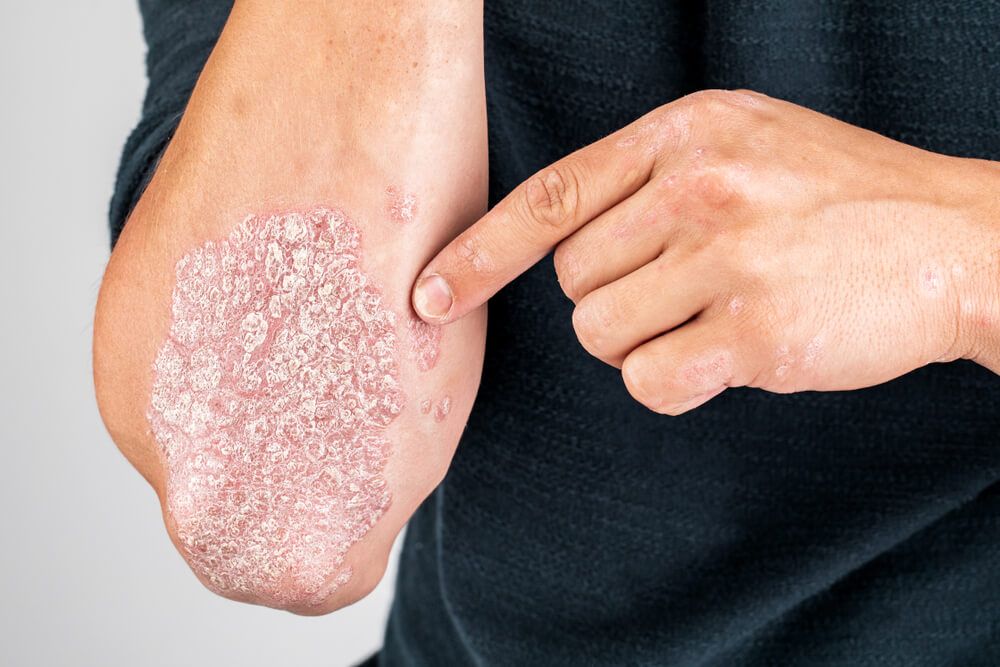Psoriasis is a persistent autoimmune condition that accelerates the life cycle of skin cells, causing them to accumulate on the skin’s surface. This accumulation leads to red, scaly patches that can be itchy and sometimes painful. At Warren Dermatology & Mohs Surgery, located in the heart of Trumbull County, including Howland, Champion, and Warren, OH, Dr. Morgan Hott, Dr. Hamrock, Victoria Dennis, FNP-C, Wendy Demetrios, FNP-C and Brianna Marin, MPAS, PA-C. work closely with patients to diagnose, treat, and manage this often complex skin condition.
Identifying Psoriasis: Key Symptoms to Note
While psoriasis can manifest differently in each individual, some common signs include:
- Red patches of skin covered with silvery scales
- Itching, burning, or soreness in affected areas
- Dry, cracked skin that may bleed
- Swollen and stiff joints
- Thickened or ridged nails
The Critical Need for Addressing Psoriasis
- Physical Discomfort: Beyond the visible symptoms, psoriasis can be uncomfortable, leading to itching, burning, or even pain in severe cases. Addressing this condition can significantly enhance the patient’s quality of life.
- Mental and Emotional Impact: The appearance of psoriasis patches can affect self-esteem and cause social anxiety. A study found that many individuals with psoriasis experience feelings of embarrassment, drawing a direct line between skin health and mental well-being.
- Potential for Complications: If left untreated, psoriasis can lead to joint complications known as psoriatic arthritis. Early detection and intervention can reduce the risk of this painful condition.
Journey to Relief: Treatment Steps at Warren Dermatology
- Consultation & Diagnosis: Dr. Morgan Hott, Dr. Hamrock, Victoria Dennis, FNP-C, Wendy Demetrios, FNP-C and Brianna Marin, MPAS, PA-C. will initiate a comprehensive evaluation, which might include a skin biopsy to confirm the diagnosis.
- Personalized Treatment Plan: Depending on the severity and type of psoriasis, a tailored treatment plan may include topical treatments, light therapy, or even systemic medications.
- Regular Monitoring & Adjustments: Treatment efficacy varies among individuals. Regular check-ups ensure that the therapy remains effective and adjustments can be made as necessary.
Psoriasis Prevention: Can Flare-Ups be Reduced?
- Healthy Lifestyle Choices: Maintaining a balanced diet, managing stress, and avoiding tobacco can reduce flare-ups’ frequency and severity.
- Timely Care: Recognizing triggers and seeking timely medical advice can prevent minor symptoms from escalating into severe flare-ups.
- Skin Protection: Avoiding cuts, scratches, or sunburns can be beneficial as these can trigger a psoriasis flare-up.
- Regular Check-Ups: Routine visits to Dr. Morgan Hott, Dr. Hamrock, Victoria Dennis, FNP-C, Wendy Demetrios, FNP-C and Brianna Marin, MPAS, PA-C can ensure that any changes in the condition are promptly addressed.
Future Prospects for Psoriasis Patients
Patients with psoriasis often undergo cycles of flare-ups and remission. With the advent of advanced medical treatments and an ever-deepening understanding of the condition, many can now enjoy extended periods of remission. Additionally, the dermatological research landscape is persistently evolving, with new treatments and therapies on the horizon, heralding an optimistic future for more effective management of the condition.
Moreover, the emphasis on patient-centered care has significantly impacted the way psoriasis is managed. As the medical community acknowledges the physical and emotional toll of this condition, there is a push towards a more holistic approach. This means focusing on medical treatments and providing resources for mental well-being, lifestyle adjustments, and patient education. This comprehensive approach promises to enhance the quality of life for those living with psoriasis, ensuring they’re equipped to handle all aspects of the condition.
Frequently Asked Questions
What causes psoriasis?
Psoriasis is an autoimmune condition where the body’s immune system attacks healthy skin cells, leading to rapid skin cell turnover and the formation of red, scaly patches.
Is psoriasis contagious?
No, psoriasis is not contagious. It cannot be passed from one person to another through touch or any other form of contact.
Are there different types of psoriasis?
Yes, there are several types of psoriasis, including plaque psoriasis, guttate psoriasis, and pustular psoriasis, among others. Each type presents with its unique symptoms and may require different treatment approaches.
Engage With Expertise
At Warren Dermatology & Mohs Surgery, our mission is more than just treating skin conditions; it’s about empowering patients with knowledge and solutions. If you or a loved one is navigating the challenges of psoriasis, allow Dr. Morgan Hott, Dr. Hamrock, Victoria Dennis, FNP-C, Wendy Demetrios, FNP-C and Brianna Marin, MPAS, PA-C to be your guiding light. Contact us at (330) 856-6365 for compassionate care and expert advice. Your skin health deserves nothing but the best, and we’re here to deliver just that.



